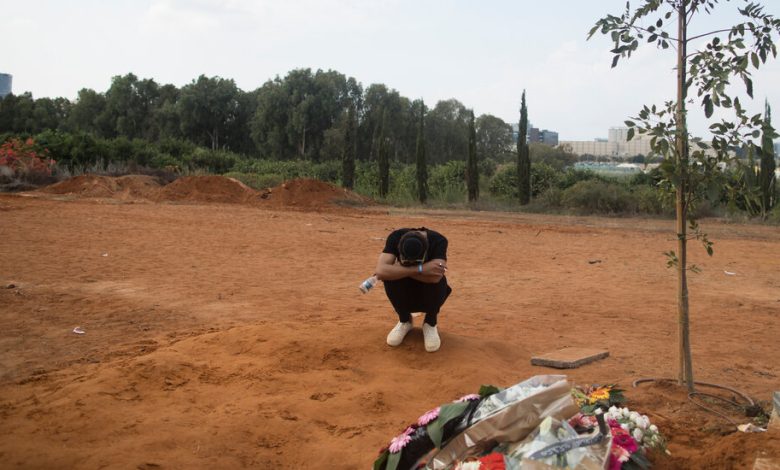The Victims in the Israel-Hamas War

More from our inbox:
- A Rabbi’s Plea
- The Mideast Battle at Harvard
- How Detrimental Is Lacking a College Degree?

The funeral for May Naim, 24, who was killed in a Hamas terrorist attack in Israel.Credit…Amir Levy/Getty Images
To the Editor:
Re “Turning Our Moral Compass to Suffering on Both Sides,” by Nicholas Kristof (column, Oct. 12):
Mr. Kristof points out the dangers of urban warfare in Gaza. However, he neglects to mention one of the dangers Israel faces as it responds to Hamas’s barbarism: Israel being wrongly blamed for the death of innocent Palestinian civilians who are accidentally killed because they are being used as human shields by Hamas.
Israel usually provides warnings to Palestinian civilians before it attacks, even though it decreases the chance of operational success and comes at the expense of Israeli lives. When Palestinian civilians suffer in Israel’s justified response to Hamas’s attack, it is imperative to place the blame on Hamas — the government that commits a war crime by using its own people as a shield.
Josh Lebewohl
New York
To the Editor:
Nicholas Kristof warns Israel to act with a “moral compass” and “humility” before engaging in a ground siege of Gaza. He cites Rabbi Jonathan Jaffe, who wrote that when the world starts complaining about such use of force, Jews won’t care.
I know Rabbi Jaffe (he is my rabbi), and he is generally liberal and progressive. Mr. Kristof should realize that the old paradigm has completely shifted now, a direct result of the absolute amorality of Hamas’s slaughter. Many of even the most liberal of Jews understand that after this display of inhumane carnage, the usual mores that guide rational actors are secondary to considerations of basic survival. This is what Israel now faces.
And despite Mr. Kristof’s lamenting a ground invasion into Gaza, everyone knows that is exactly what Hamas itself wants, with all the accompanying bloodshed and loss of innocent life that will ensue. Directions to abide by a “moral compass” should be directed at Hamas and the Palestinians who support Hamas, not Israel.
Dora Straus
Chappaqua, N.Y.
To the Editor:
Re “Rescuers in Gaza Are Struggling to Pull People From the Rubble” (news article, Oct. 12):
Imagine a world where on Sunday Egypt, in coordination with other Arab countries, had opened the Rafah border crossing to evacuate Palestinian women and children from Gaza.
Imagine stories covering the safe corridors provided by Hamas to transport families out of harm’s way.
Imagine images echoing the fleeing Ukrainian families in trains, but instead, Palestinian families in Jeeps heading to Sinai.
Image humanitarian aid on the Sinai border, led and coordinated by the Arab League.
Imagine if all the care for Palestinian lives extended beyond punishing Israel and the Jewish people.
We imagine it, because it is not the world we currently live in.
Jessica Haller
Bronx
The writer is a board member of the Jewish Community Relations Council of New York.
A Rabbi’s Plea
To the Editor:
The former Hamas leader Khaled Meshaal’s call for a day of global jihad on Friday, Oct. 13, is frightening. The Jewish community in America is already suffering from the tragedy unfolding in Israel, and enduring a sharp spike in antisemitic violence. The specter of Islamist terror here at home only adds to our anxieties.
But what alarms me equally about this call to mobilization is that it will cause many Americans, who are already afraid, to look at their Muslim neighbors with suspicion. I have dedicated much of my rabbinate to building bridges between faiths.
And while there are those who hold militant beliefs within every community, it is critical that we acknowledge that the overwhelming majority of American Muslims view Hamas’s atrocities with the same horror the rest of us do.
During the days since the barbaric assault on Israel, I have received many calls from neighbors, partners and friends in the Muslim community expressing nothing but concern and prayers. We should return that solidarity with appreciation, not suspicion.
Joshua M. Davidson
New York
The writer is the senior rabbi of Congregation Emanu-El of the City of New York.
The Mideast Battle at Harvard
To the Editor:
Re “At Harvard, a Battle Over What Should Be Said About the Hamas Attacks” (news article, nytimes.com, Oct. 10):
Harvard students — like students everywhere — are young, idealistic, sometimes very inspiring, sometimes very immature. They are also often self-important. Why is this news?
As a Jewish alum, I am still in a lot of Harvard-affiliated group chats where people disagree with me, sometimes in ways I find insensitive, even abhorrent. Of course this upsets me. But right now I’m focused on making sure my friends and family in Israel and Palestine are safe, not pouncing on campus letters or vilifying others’ expressions of grief.
There will be time for the difficult processes of investigating war crimes, mourning those we’ve lost and charting a path forward.
Covering intra-campus squabbles as national news is, at best, unproductive, and at worst actively harmful to students and their families, who get sucked into online vitriol from all sides. Let’s focus on people in Israel and Gaza, and their struggles and their stories. Leave Ivy League campuses out of it.
Maddie Ulanow
Baltimore
The writer is an alum of the Harvard Kennedy School.
How Detrimental Is Lacking a College Degree?
To the Editor:
Re “The High Cost of Not Having a College Degree,” by Anne Case and Angus Deaton (Opinion guest essay, Oct. 7):
While this essay certainly outlines the benefits and cachet of a college education and its impact on future employment, it completely excludes the merit of other types of education, such as trade and vocational schools, which equip people with valuable skills leading to long-term, respectable careers and the ability to support oneself.
Not everyone can or should attend college. The authors missed the boat by not acknowledging this fact and completely ignoring other viable means of obtaining employment in today’s job market.
Jody Doman
New York
The writer is a retired guidance counselor.
To the Editor:
Unfortunately, Anne Case and Angus Deaton, who found life expectancy to be associated with having a college degree, conflate correlation with causation. Having a college degree, and more so a college education, is important, and useful in many ways, but expecting a difference in life expectancy probably is not one of them.
People without a college degree are likely to come from a group that is already disadvantaged, and so is unlikely to have either access to adequate health care or the family financial, emotional and cultural support that permits people to have both a college education and a better life expectancy.
Fortunately, approaches such as opening more jobs to those without college degrees and making health care more readily available to all have the potential to be effective in improving both. But it will be more because of their broader sociological effects than on the number of college graduates.
Robert H. Palmer
New York




